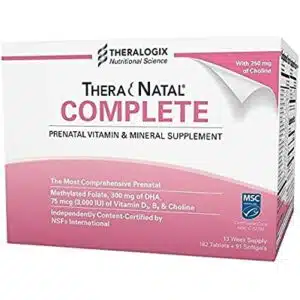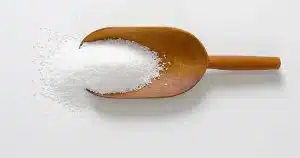PCOS can be a difficult condition to manage, especially during pregnancy. If you’re looking for the best prenatal vitamins for PCOS, read on for my top picks. We’ll discuss the benefits of each vitamin and how they can help you manage your PCOS symptoms. Plus, we’ve included a few tips on how to make sure you’re getting the most out of your prenatal vitamins. So whether you’re just starting to planning your pregnancy or are already pregnant, read on for the best prenatal vitamins for PCOS!
Why Should you Take a Prenatal Vitamin?
If you’re pregnant or trying to get pregnant, it’s important to make sure you’re taking a prenatal vitamin. Prenatal vitamins provide essential nutrients that are important for both you and your baby. They can help prevent some common pregnancy-related problems, such as nausea and constipation. And they can also help ensure a healthy pregnancy and healthy baby.
When should you start taking Prenatal Vitamins?

Also, there are some nutrients that are particularly important in the very early stages of pregnancy. For example, folic acid supplements are recommended during the first trimester to help prevent neural tube defects in your baby.
If you start taking prenatals before you start trying to conceive, you can be assured that you are giving your baby the key nutrients it needs for healthy development before you even find out that you are pregnant.
What to look for in a Prenatal Vitamin

Folate or Folic Acid
Folate is one of the B vitamins and is important for the development of your baby’s spinal cord. That’s why it’s so important to take it before you conceive and during early pregnancy, when your baby’s neural tube is developing.
It has also been shown to help prevent some birth defects, such as heart defects and cleft lip (1).
The recommended daily amount of folate for pregnant women is 400 micrograms (mcg).
You can find folate in leafy green vegetables, legumes, nuts, and fortified foods. But it can be difficult to get enough from diet alone, which is why doctors recommend pregnant women take a supplement.
Iron
Iron is important for growing babies because it helps carry oxygen to your baby’s developing body. It also prevents anemia, a common pregnancy-related problem caused by iron deficiency.
The recommended daily amount of iron for pregnant women is 27 milligrams (mg) (2).
You can find iron in meat, poultry, seafood, legumes, and fortified foods. However, many pregnant women need to take an iron supplement because it can be difficult to get enough from diet alone.
Calcium
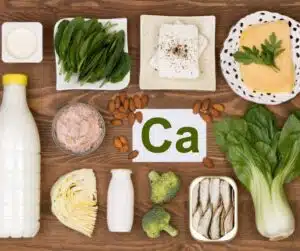
The recommended daily amount of calcium for pregnant women is 1000 mg (3).
You can find calcium in leafy green vegetables, and fortified foods. But many pregnant women need to take a supplement to get enough calcium.
Vitamin D
Vitamin D is important for the absorption of calcium. It can also help prevent certain birth defects, such as spina bifida.
It is also such an important vitamin for improving your fertility with PCOS and research shows that about 80% of women with PCOS are deficient in this all important vitamin.
So, including Vitamin D in your prenatal supplement is important.
The recommended daily amount of vitamin D for pregnant women is 4000 IU (international units) (4).
You can find vitamin D in fatty fish, such as salmon and tuna. You can also get it from fortified foods, such as milk and orange juice. But the best way to get enough vitamin D is to spend time in the sun. Just make sure to wear sunscreen to protect your skin.
Omega-3 fatty acids
Omega-3 fatty acids are important for your baby’s brain and eye development. They can also help prevent certain birth defects, such as heart defects.
We also know that women with PCOS are prone to chronic inflammation which makes insulin resistance worse. Omega 3’s are so important for women with polycystic ovarian syndrome as they help to combat inflammation and improve insulin sensitivity and have been shown to lower androgen levels.
The recommended daily amount of omega-3 fatty acids for pregnant women is 300 mg DHA daily. (5)
You can find omega-3 fatty acids in fatty fish, such as salmon and tuna. You can also get them from flaxseed, chia seeds, and walnuts. But the best way to get omega-3 fatty acids is to take a supplement. Although you can take a plant based Omega 3, Omega from fish oil tends to be a more usable form and more bio-readily available.
So, what is the best prenatal vitamin to help ensure you have a healthy pregnancy?
What are the best Prenatal Vitamins for PCOS?
There are many different prenatal vitamins on the market, so it can be tough to choose the right one. When you’re looking for a prenatal vitamin, it’s important to consider your individual needs. If you have PCOS, you may want to look for a prenatal vitamin that contains higher levels of certain nutrients, such as folic acid, calcium, and Vitamin D. Here are my top picks for the best prenatal vitamins for PCOS:
TheraNatal Complete Prenatal Vitamins
TheraNatal Complete comes from Theralogix, the same company that makes Ovasitol, one of the best PCOS supplements.
Theralogix produces high quality, independently tested, gluten free and artificial dye free supplements.
ThereNatal Complete is a high quality prenatal vitamin that contains the key nutrients essential for a healthy pregnancy, including: DHA (Omega 3), methylated folate, vitamin D, vitamin B6, choline and more. TheraNatal also has a higher dose of that all-important Vitamin D than many other prenatals have.
You can get TheraNatal at the best price from Theralogix, using PR Code 144144
Pink Stork Total Prenatal Vitamin with DHA and Folic Acid
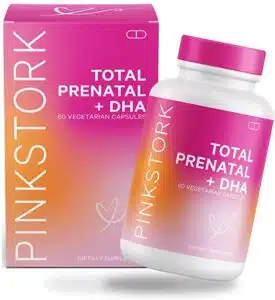
With high doses of Vitamin D and Omega 3s, this prenatal also includes a wide variety of other essential nutrients for pregnancy, including: vitamins C, E and B complex, zinc, selenium, copper, manganese, chromium and more.
You can get Pink Stork Total Prenatal at the best price from Amazon.
Nature Made Prenatal with Folic Acid + DHA
Nature Made Prenatal has a great price point whilst still proving quality ingredients and the key nutrients we’re looking for to promote healthy development and a healthy pregnancy.
You can also get Nature Made Prenatal from Amazon.
Questions about Prenatal Vitamins for PCOS
What is the Difference between Prenatal and Preconception Vitamins?

When it comes to PCOS, we need a little more help with egg quality, thanks to the hormonal imbalance we all suffer from. Poor egg quality is common in PCOS and can have a huge impact on fertility and the ability to conceive.
So, a preconception vitamin might be a good idea if you think you may want to start a family in the near-future.
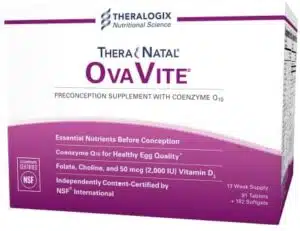
Also, Ovasitol has been shown to improve insulin levels and improve ovulation rates in women with PCOS.
Will Prenatal Vitamins Help Me to Conceive if I Have PCOS?
There is no guarantee that taking prenatal vitamins will help you to conceive if you have Polycystic Ovary Syndrome. There are many other ways to improve your fertility and give your body the best chance of conceiving. Some of these things include:
- Following a good PCOS diet to help you manage all of your PCOS symptoms and make sure that all of your nutritional needs are well-met.
- If you are overweight, focusing on weight management can be helpful. Research shows that losing just 5% of your body weight can help restore menstrual regularity and thereby increase your changes of conceiving
- Taking other supplements like Vitamin D, Inositol and Omega 3
If you want more information on the impact of PCOS on fertility, you should check out my PCOS and Fertility Program.
Will Prenatals Help to Prevent Gestational Diabetes?
We know that women with PCOS are at higher risk of developing gestational diabetes. There are definitely things that you can do to lower this risk, like taking Inositol and eating well for your PCOS. However, relying on prenatal vitamins alone may not be enough.
Your healthcare provider should monitor you throughout your pregnancy and keep an eye on your glucose tolerance, blood pressure (we are also more at risk to pre-eclampsia) as well as other potential complications.
You may also find this article on PCOS and Pregnancy Risk Factors helpful if you are trying to get pregnant with PCOS.
Summing it Up
That’s it for today! In summary, we talked about the benefits of each prenatal vitamin and how they can help you manage your PCOS symptoms. I hope this article was helpful and gave you some good information to think about. If you have any questions about prenatal supplements or PCOS, leave me a comment below – I’d be happy to answer them. And if you found this post useful, please share it with your friends and family on social media. Thanks for reading!
- sustainable pcos weight loss strategies
- Over 5500 women have done it and seen results
- [bonus] Done for you pcos meal plans
- [bonus] intermittent fasting for pcos course
- [BONUS] personalised nutrition plan
JOIN OVER 5,500 OTHERS
References:
1Obeid, R., et al. “Folate Supplementation for Prevention of Congenital Heart Defects and Low Birth Weight: An Update – PMC.” PubMed Central (PMC), www.ncbi.nlm.nih.gov, 1 Oct. 2019, https://www.ncbi.nlm.nih.gov/pmc/articles/PMC6837928/.
2Johnson, T. “Iron During Pregnancy: Quantity, Supplements, Iron-Rich Foods.” WebMD, www.webmd.com, 15 Dec. 2020, https://www.webmd.com/baby/are-you-getting-enough-iron.
3Dailey, K. “Get the Calcium You Need During Pregnancy.” WebMD, www.webmd.com, 19 Mar. 2021, https://www.webmd.com/baby/get-the-calcium-you-need-during-pregnancy.
4“Vitamin D and Pregnancy – American Pregnancy Association.” American Pregnancy Association, americanpregnancy.org, 25 Apr. 2017, https://americanpregnancy.org/healthy-pregnancy/pregnancy-health-wellness/vitamin-d-and-pregnancy/.
5“Omega-3 Fish Oil and Pregnancy – American Pregnancy Association.” American Pregnancy Association, americanpregnancy.org, 27 Apr. 2021, https://americanpregnancy.org/healthy-pregnancy/pregnancy-health-wellness/omega-3-fish-oil-and-pregnancy/.

